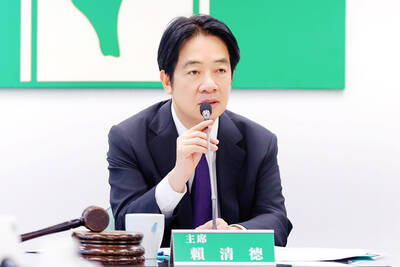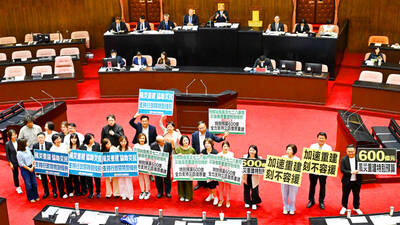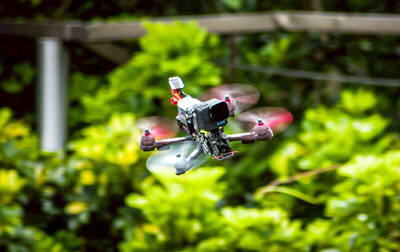US Secretary of State Condoleezza Rice pressed China’s leaders yesterday on sensitive human rights issues, but said she was encouraged by their decision to hold talks with the Dalai Lama’s envoys.
In meetings with Chinese President Hu Jintao (胡錦濤)and Premier Wen Jiabao (溫家寶) in Beijing, Rice said she raised the cases of several dissidents detained by China as well as the ruling Communist Party’s controls on the Internet.
“I think that is one of the brewing issues,” Rice said as she summarized their discussions on Internet freedoms.
“The Internet is becoming so ubiquitous. It shouldn’t be something used to constrain and limit political speech,” she said.
Differences over the international response to the political crisis in Zimbabwe were also discussed, with Rice insisting the UN Security Council had a key role to play despite China’s preference for a mainly African solution.
Rice said the talks also covered the recent progress in the long-running campaign to end North Korea’s nuclear weapons programs, problems in the international economy and climate change.
In brief comments at the start of their meeting, Hu thanked Rice for visiting China’s earthquake-hit Sichuan Province on Sunday as well as US assistance following the disaster in May that left nearly 90,000 people dead.
Rice told reporters the recent unrest in Tibet was also discussed, with the top US diplomat expressing cautious optimism over Beijing’s decision to hold further talks with envoys of the region’s spiritual leader, the Dalai Lama.
“I am encouraged that there at least will be a second round of talks,” she said.
However she repeated that the US did not accept China’s accusations that the Dalai Lama was bent on achieving independence for his Himalayan homeland, which has been ruled by China for nearly 60 years.
“The Dalai Lama is a figure of considerable moral authority. He is a figure who has rejected violence. He is a figure who talks about cultural and religious historical autonomy,” she said. “He doesn’t push for political independence.”
Her comments came as the Tibetan government-in-exile said envoys of the Dalai Lama were expected to arrive in Beijing later yesterday for two days of talks with Chinese officials.

President William Lai (賴清德) yesterday criticized the nuclear energy referendum scheduled for Saturday next week, saying that holding the plebiscite before the government can conduct safety evaluations is a denial of the public’s right to make informed decisions. Lai, who is also the chairman of the Democratic Progressive Party (DPP), made the comments at the party’s Central Standing Committee meeting at its headquarters in Taipei. ‘NO’ “I will go to the ballot box on Saturday next week to cast a ‘no’ vote, as we all should do,” he said as he called on the public to reject the proposition to reactivate the decommissioned

US President Donald Trump on Friday said that Chinese President Xi Jinping (習近平) told him China would not invade Taiwan while Trump is in office. Trump made the remarks in an interview with Fox News, ahead of talks with Russian President Vladimir Putin over Moscow’s invasion of Ukraine. “I will tell you, you know, you have a very similar thing with President Xi of China and Taiwan, but I don’t believe there’s any way it’s going to happen as long as I’m here. We’ll see,” Trump said during an interview on Fox News’ Special Report. “He told me: ‘I will never do

The Legislative Yuan yesterday approved an aid and recovery package authorizing the government to allocate up to NT$60 billion (US$1.99 billion) for regions hit by Typhoon Danas and subsequent torrential rains last month. Proposed by the Executive Yuan on Aug. 7, the bill was passed swiftly after ruling and opposition lawmakers reached a consensus in inter-party talks on relief funding and assistance for disaster-stricken areas. The package increases the government’s spending cap from the originally proposed NT$56 billion to NT$60 billion, earmarked for repairing and rebuilding infrastructure, electricity systems, telecommunications and cable TV networks, cultural heritage sites and other public facilities.

FLEXIBLE FORCE: Only about 10 percent of small drones reach their target, an expert said, which is why it is important to make it easier to procure large numbers of drones The military is planning to recategorize military drones as “consumables/munitions,” rather than as aircraft, to speed up the procurement process, the army said yesterday. The Army Command Headquarters said the decision was made because drones, like munitions, need to be rapidly replaced, and thus should be categorized as consumables/munitions “to meet the army’s practical needs.” The headquarters’ confirmation came after the Chinese-language Liberty Times (the Taipei Times’ sister paper) early yesterday reported that the army was about to make the classification change based on the example of the US, which is Taiwan’s biggest arms provider. US Secretary of Defense Pete Hegseth announced a